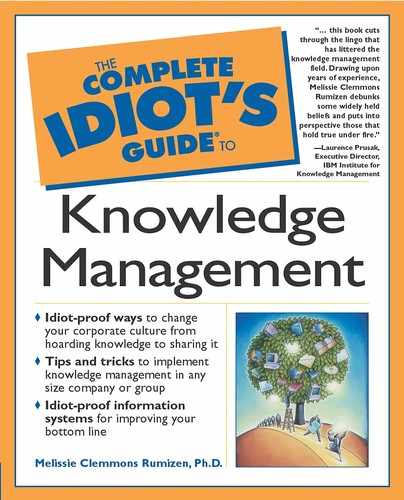Foreword
Knowledge management has been easily dismissed by some as just the latest management fad. Dilbert has lampooned it. Untold software vendors slap the label of KM on their packages and tout miraculous cures for all our knowledge failings. Yet, behind all the jargon and the hype, we find companies engaged in serious efforts to manage their most precious asset—their working knowledge.
Managing knowledge is clearly one of the new fundamentals for success in the new economy. It is a tough job and few organizations do it well. Knowledge management involves many complex organizational issues; simplistic approaches will not work, nor will throwing technologies at people somehow magically make knowledge happen.
Written by an expert practitioner, this book cuts through the lingo that has littered the knowledge management field. Drawing upon years of experience, Melissie Clemmons Rumizen debunks some widely held beliefs and puts into perspective those that hold true under fire. She provides a solid review of the knowledge-based ideas and practices that have most influenced how companies function. Both those new to the questions and those seeking to improve their current efforts will enjoy this practical, savvy guided tour through the eclectic mix of disciplines, concepts, methods, and approaches that form the field of knowledge management.
Far too many people working in KM obsess over creating the perfect approach. The important thing is to start asking the knowledge questions and be willing to experiment in various ways. Rumizen shows us how to do this by focusing on common-sense principles and sharpening our senses to sniff out the knowledge value to the business.
Rumizen covers a wide range of related topics, ranging from how to work with information technology to the fine points of a communications strategy. The most important of these topics is dealing with an organizational culture and managing change. She quite rightly assesses that challenge is the biggest potential barrier and offers practical tips for meeting that challenge.
This is not an unwieldy academic tome; Rumizen follows the dictum of Oscar Wilde to treat unimportant things seriously and important things lightly. It is good to remember that humor and humility serve any change effort well, including becoming more knowledge-focused.
Leading a knowledge management effort within an organization is a sometimes thankless job and it requires a jack-of-all-trades. Rumizen zeroes in on the skills needed, the expertise required, and above all the mind-set demanded. Successful initiatives in KM require imagination, daring, persistence, an entrepreneurial spirit, and a willingness to occasionally be outrageous and outspoken. You must be prepared to win big—or fail greatly. But the potential prize for your organization matches the size of the challenge.
Managing knowledge must become part of how every organization does business. Those who fail to manage what they know simply cannot be serious players in the new business environment.
—Laurence Prusak
Executive Director, IBM Institute for Knowledge Management
Mr. Prusak is the co-author of several books on knowledge management: In Good Company: How Social Capital Makes Organizations Work (with Don Cohen), Harvard Business School Press, 2001; Working Knowledge: How Organizations Manage What They Know (with Thomas H. Davenport), Harvard Business School Press, 1997; and Information Ecology: Mastering the Information and Knowledge Environment (with Thomas H. Davenport), Oxford University Press, 1997. He is also the editor of Knowledge in Organizations, Butterworth-Heinemann, 1997.
..................Content has been hidden....................
You can't read the all page of ebook, please click here login for view all page.
